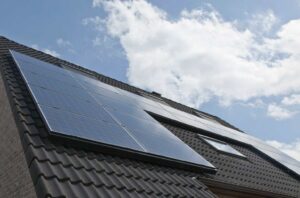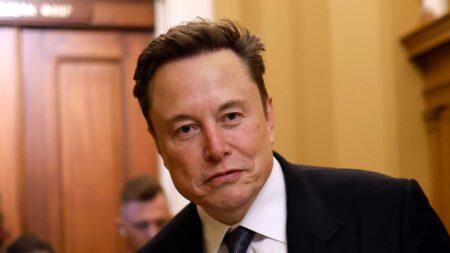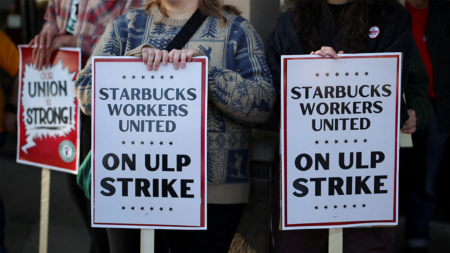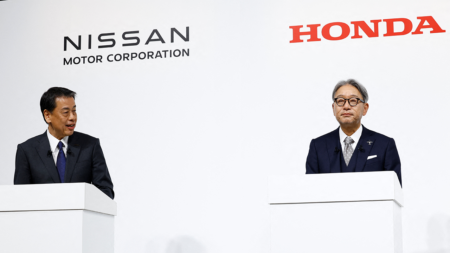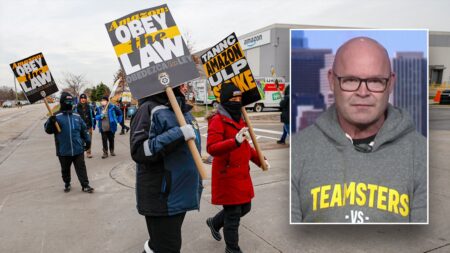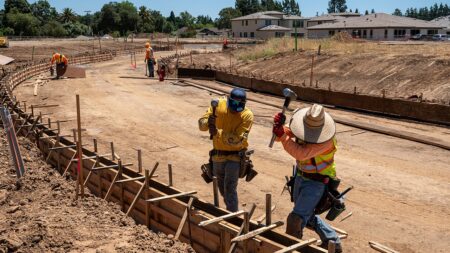(Reuters) – A Hong Kong court on Monday ordered the liquidation of China Evergrande (HK:) Group, a move likely to send ripples through China’s crumbling financial markets as policymakers scramble to contain the deepening crisis.
MARKET REACTION:
Trading was halted in shares of China Evergrande, China Evergrande New Energy Vehicle Group, and Evergrande Property Services.
The benchmark closed 0.8% higher.
COMMENTARY:
HAO HONG, PARTNER AND CHIEF ECONOMIST AT GROW INVESTMENT GROUP, HONG KONG
“It’s not clear whether the ruling by the Hong Kong court today can achieve the recognition of the three designated courts in mainland (China) under a 2021 legal arrangement.”
“While the Hong Kong court can appoint a liquidator, without the recognition from the mainland court it’s hard to execute the liquidation process, as the liquidator will not have much power over Evergrande’s assets that mostly sit in the mainland.”
“Whether the liquidation process can proceed or not, Evergrande has been trading as if it’s going for bankruptcy. Its bonds trade at less than two cents to a dollar.”
FERN WANG, SENIOR RESEARCHER, KT (NYSE:) CAPITAL GROUP, HONG KONG
“Evergrande’s situation is more complicated than other developers as its founder Hui Ka Yan is under arrest and its major subsidiary in China Hengda Real Estate Group is being investigated.”
“The investigation has precluded the company from issuing new debts and limits its ability to reach an agreement with its creditors.”
“Recovery hopes are grim given the heavy indebtedness of the company and the often-structural subordinated position of the offshore creditors.”
REDMOND WONG, CHIEF CHINA STRATEGIST, SAXO MARKETS, HONG KONG
“For overseas creditors, focus will be on if the liquidator will succeed in its applications for assistance to mainland courts in Shanghai, Shenzhen and Xiamen under the cooperation mechanism established in 2021, and get hold of assets in the mainland.”
“For shareholders of the listed company (of Evergrande) in Hong Kong, the likelihood of getting anything out of the winding-up process is very low.”
RAYMOND CHENG, HEAD OF CHINA RESEARCH, CGS-CIMB SECURITIES, HONG KONG
“The liquidation order will be negative for Evergrande itself for sure. The assigned liquidator will offload the company assets as soon as possible, and the price may be very bad.
“It might affect sector sentiment in the short term, but Evergrande’s restructuring has its own specific problems. It is possible that other developers will be willing to compromise more in negotiations as they fear creditors will be applying for liquidation.”
KENNY NG, SECURITIES STRATEGIST, CHINA EVERBRIGHT SECURITIES INTERNATIONAL COMPANY, HONG KONG
“This may further impact the confidence of mainland creditors and increase the difficulty of Evergrande’s restructuring in mainland China.”
“(It) may also affect investors’ confidence in the mainland real estate industry and the willingness of mainland residents to purchase properties. This has the potential to have a dampening effect on the economy and the capital market.”
CHRIS BEDDOR, DEPUTY DIRECTOR OF CHINA RESEARCH, GAVEKAL DRAGONOMICS, HONG KONG
“Evergrande is a unique case in many respects, but it does underscore that the overall situation for property developers has not meaningfully improved in recent months. In fact, the industry continues to worsen in some ways.”
“There’s also a fairly clear transmission mechanism for how this impacts the mainland market – homebuyer sentiment. Potential homebuyers are still deeply reluctant to buy presold homes from troubled developers, and we see that reflected in the data.”
NICHOLAS CHEN, ANALYST, CREDITSIGHTS, SINGAPORE
“For other troubled Chinese developers, overall market sentiment would undoubtedly be affected.”
“The cases of Evergrande and Jiayuan, which also received a winding-up order in May last year, highlight that defaulted developers would need to provide a concrete restructuring plan to the HK courts, and they do not have a perpetual runway to do so.”
“In terms of regulatory stance, we expect the increasingly supportive policy environment to provide some breathing room for the cash-strapped property sector… We expect the regulatory support to remain bifurcated and biased towards the stronger (mostly state-linked) developers.”
DAMIEN BOEY, CHIEF MACRO STRATEGIST, BARRENJOEY, SYDNEY
“The best thing that you can do as a policymaker… is to make sure that you take control of these unwind processes and make them orderly. And I think that’s what they’re doing.
“If you can do that, then you can avoid more blow-ups and unforeseen issues in the property sector. And, you can avoid some of the collateral damage.
“I think we’re closer to the end of this wind-up cycle than the beginning, provided that policymakers do what the market actually wants them to do, which is… stimulate growth and support the property sector.”
ANDREW COLLIER, MANAGING DIRECTOR, ORIENT CAPITAL RESEARCH, HONG KONG
“Evergrande’s liquidation is a sign that China is willing to go to extreme ends to quell the property bubble. This is good for the economy in the long term, but very difficult in the short term.”
MATT SIMPSON, SENIOR MARKET ANALYST, CITY INDEX, BRISBANE
“I think the bigger surprise here is that it took so long for Evergrande to be liquidated. Clearing out the deadwood should be seen as a positive, but I doubt it will boost confidence in the property sector on this news alone.”
BACKGROUND
* Evergrande defaulted on offshore debt in late 2021, becoming a symbol of the debt crisis that has engulfed China’s property sector.
* The world’s most indebted developer has around $300 billion of liabilities and $240 billion of assets.
* The liquidation petition was first filed in June 2022 by Top Shine, an investor in Evergrande unit Fangchebao, which said the developer had failed to honour an agreement to repurchase shares it had bought in the subsidiary.
* Evergrande had been working on a $23 billion debt revamp plan for two years.
* Its original plan was scuppered in late September when it said its billionaire founder Hui Ka Yan was under investigation for suspected crimes.
* An ad hoc bondholder group had been siding with the developer in opposing the liquidation petition until the last hearing in early December.
Read the full article here

